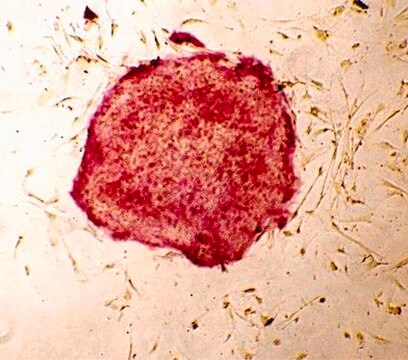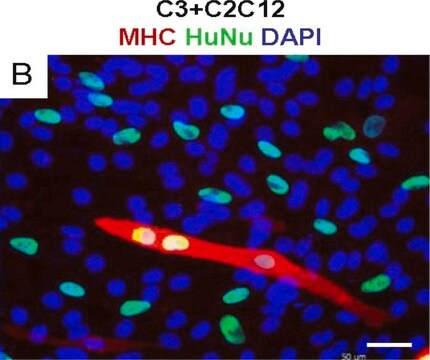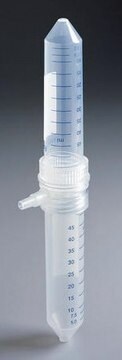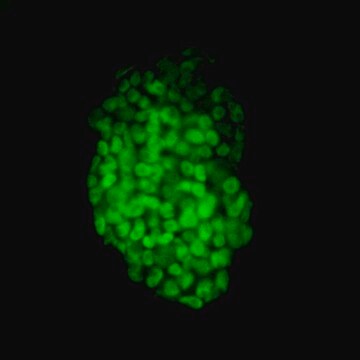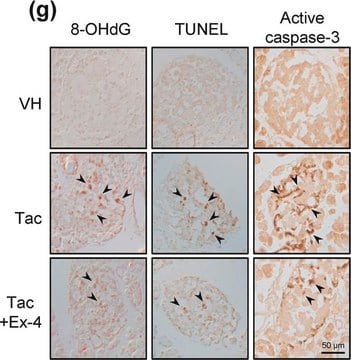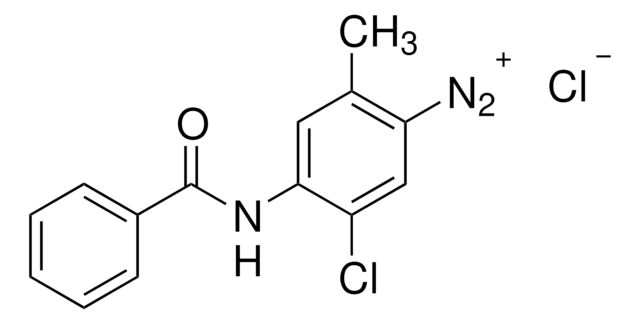SCR001
ES Cell Characterization Kit
The Embryonic Stem Cell Characterization Kit phenotypically assesses the differentiation status of ES cells by measuring their AP activity, cell-surface stage-specific antigens (SSEA-1, SSEA-4) as well as expression of TRA-1-60, TRA-1-81 antigens.
About This Item
Produits recommandés
Niveau de qualité
Espèces réactives
human, mouse, rat
Fabricant/nom de marque
Chemicon®
Technique(s)
cell culture | stem cell: suitable
immunocytochemistry: suitable
Entrée
sample type: human embryonic stem cell(s)
sample type: mouse embryonic stem cell(s)
sample type induced pluripotent stem cell(s)
Conditions d'expédition
wet ice
Description générale
INTRODUCTION
Stem cells have become the subject of extensive investigation recently, partly due to their therapeutic potential and because they raise several fundamental issues concerning the regulation of proliferation and differentiation.
Embryonic stem (ES) cells are derived from totipotent cells of the early mammalian embryo and are capable of unlimited, undifferentiated proliferation in vitro [Evans and Kaufman, 1981; Martin, 1981; Morrison, 1997]. Undifferentiated mouse ES cells can be maintained for an extensive period of time in media containing the cytokine, leukemia-inhibitory factor (LIF) or CHEMICON′s proprietary ES cell culture reagent, ESGRO® [Smith, 1988; Williams, 1988]. However, upon removal of LIF from the culture medium, in vitro, the mouse ES cells start to differentiate into cells derived from all three germ layers. In contrast, human ES cultures require mouse fibroblasts as feeder cells and cannot be maintained with LIF for self-renewal [Thomson and Marshall, 1998; Shamblott, 1988].
The undifferentiated state of the embryonic stem cell is characterized by a high level of expression of alkaline phosphatase (AP) [Pease, 1990] and the stem cell transcription factor, Oct-4. Nevertheless, these ES cells also exhibit marked differences from their murine counterparts in regards to their expression of stage-specific embryonic antigen (SSEA), that typify undifferentiated human ES and embryonic carcinoma (EC) cells.
SSEA-1, a carbohydrate antigen, is a fucosylated derivative of type 2 polylactosamine and appears during late cleavage stages of mouse embryos. It is strongly expressed by undifferentiated, murine ES cells [Solter and Knowles, 1978; Gooi, 1981]. Upon differentiation, murine ES cells are characterized by the loss of SSEA-1 expression and may be accompanied, in some instances, by the appearance of SSEA-3 and SSEA-4 [Solter, 1979]. In contrast, human ES and EC cells typically express SSEA-3 and SSEA-4 but not SSEA-1, while their differentiation is characterized by downregulation of SSEA-3 and SSEA-4 and an upregulation of SSEA-1 [Andrews, 1984; Fenderson and Andrews; 1987]. Undifferentiated, human ES cells also express the keratin sulphate-associated antigens, TRA-1-60 and TRA-1-81 [Andrews and Banting, 1984].
CHEMICON′s ES Cell Characterization Kit (Catalog number SCR001) is a specific and sensitive tool for the phenotypic assessment of the differentiation status of ES cells by measuring their AP activity, cell-surface stage-specific antigens (SSEA-1, SSEA-4) as well as expression of TRA-1-60, TRA-1-81 antigens.
Application
Stem Cell Research
Composants
Napthol AS-BI phosphate solution (4mg/mL) in AMPD buffer (2mol/L), pH 9.5 (Part No. 90234). One 15mL bottle.
MS X SSEA-1, IgM, clone MC-480 (Part No. 90230). One vial containing 100μl of 1mg/mL monoclonal antibody.
MS X SSEA-4, IgG, clone MC-813-70 (Part No. 90231). One vial containing 100μl of 1mg/mL monoclonal antibody.
MS X TRA-1-60, IgM, clone TRA-1-60 (Part No. 90232). One vial containing 100μl of 1mg/mL monoclonal antibody
MS X TRA-1-81, IgM, clone TRA-1-81 (Part No: 90233). One vial containing 100μl of 1mg/mL monoclonal antibody.
Stockage et stabilité
Informations légales
Clause de non-responsabilité
Mention d'avertissement
Warning
Mentions de danger
Conseils de prudence
Classification des risques
Carc. 2 - Eye Irrit. 2 - Skin Irrit. 2
Code de la classe de stockage
10 - Combustible liquids
Certificats d'analyse (COA)
Recherchez un Certificats d'analyse (COA) en saisissant le numéro de lot du produit. Les numéros de lot figurent sur l'étiquette du produit après les mots "Lot" ou "Batch".
Déjà en possession de ce produit ?
Retrouvez la documentation relative aux produits que vous avez récemment achetés dans la Bibliothèque de documents.
Les clients ont également consulté
Notre équipe de scientifiques dispose d'une expérience dans tous les secteurs de la recherche, notamment en sciences de la vie, science des matériaux, synthèse chimique, chromatographie, analyse et dans de nombreux autres domaines..
Contacter notre Service technique
